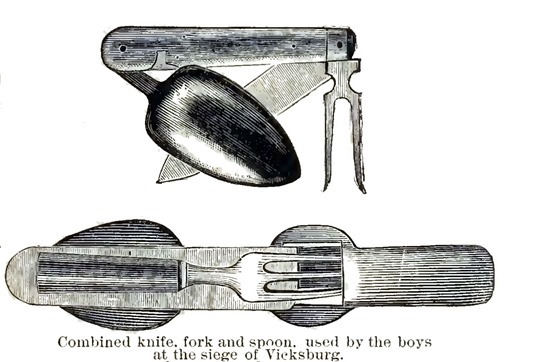26th June (Friday).—I got up a little before daylight, and, notwithstanding the drenching rain, I secured our horses, which, to my intense relief, were present. But my horse showed a back rapidly getting worse, and both looked “mean” to a degree. Lawley being ill, he declined starting in the rain, and our host became more and more surly when we stated our intention of remaining with him. However, the sight of real gold instead of Confederate paper, or even greenbacks, soothed him wonderfully, and he furnished us with some breakfast. All this time McLaws’s division was passing the door; but so strict was the discipline, that the only man who loafed in was immediately pounced upon and carried away captive. At 2 P.M., the weather having become a little clearer, we made a start, but under very unpromising circumstances. Lawley was so ill that he could hardly ride; his horse was most unsafe, and had cast a shoe ;—my animal was in such a miserable state that I had not the inhumanity to ride him ;—but, by the assistance of his tail, I managed to struggle through the deep mud and wet. We soon became entangled with McLaws’s division, and reached the Potomac, a distance of nine miles and a half, at 5 P.M. ; the river is both wide and deep, and in fording it (for which purpose I was obliged to mount) we couldn’t keep our legs out of the water. The little town of Williamsport is on the opposite bank of the river, and we were now in Maryland. We had the mortification to learn that Generals Lee and Longstreet had quitted Williamsport this morning at 11 o’clock, and were therefore obliged to toil on to Hagerstown, six miles farther. This latter place is evidently by no means Rebel in its sentiments, for all the houses were shut up, and many apparently abandoned. The few natives that were about stared at the troops with sulky indifference.
After passing through Hagerstown, we could obtain no certain information of the whereabouts of the two generals, nor could we get any willing hospitality from any one; but at 9 P.m., our horses being quite exhausted, we forced ourselves into the house of a Dutchman, who became a little more civil at the sight of gold, although the assurance that we were English travellers, and not Rebels, had produced no effect. I had walked to-day, in mud and rain, seventeen miles, and I dared not take off my solitary pair of boots, because I knew I should never get them on again.












